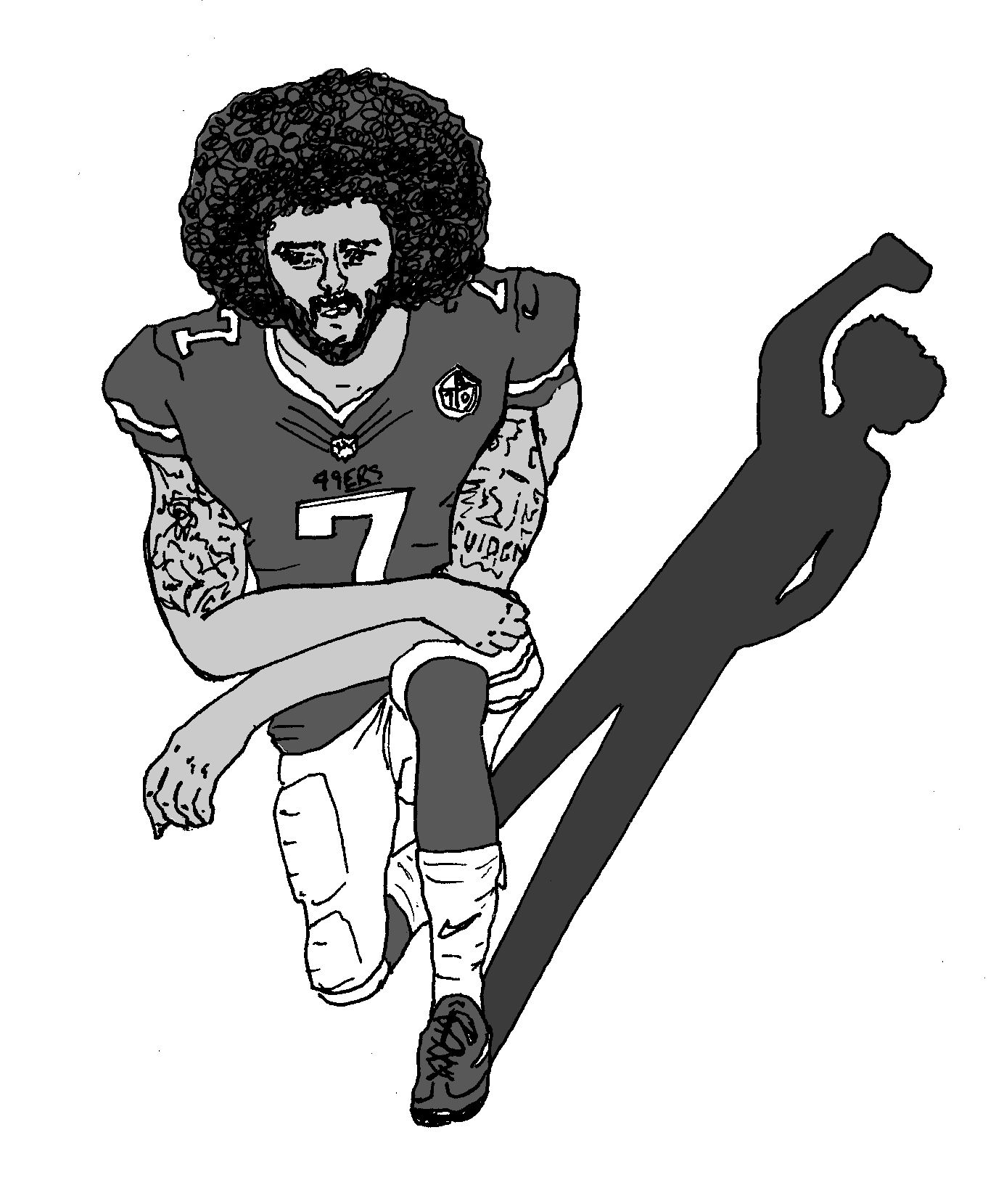#TakeAKnee : a commentary on patriotism in America
September 29, 2017
 This
piece represents the opinion of the author
.
This
piece represents the opinion of the author
.
“I get it; you have the right to protest, but you don’t kneel during the national anthem. That’s just unacceptable.” My good-intentioned white male friend made this comment in Thorne dining hall two years ago in light of Colin Kaepernick’s decision to ‘take a knee.’ Simply put, I was shook. I couldn’t voice my opinion as strongly as I wanted to because the dinner table was full of white men and I knew I was in the minority. When asked why he knelt down during the national anthem in the summer of 2016, San Francisco 49ers Quarterback Colin Kaepernick said he was not going to “stand up to show pride in a flag for a country that oppresses black people and people of color.” To him, the fact that black American men were being disproportionately targeted and killed by police is contradictory to the ideals of equality that are deeply rooted in America’s political philosophies. Today in 2017, Kaepernick still kneels during the national anthem because he doesn’t misconstrue love for the United States with blind patriotism.
My friend’s patriotic spirit is primarily evoked by symbols coming in the form of a flag or a national anthem. My own patriotism is dynamic, sometimes taking the form of protest against injustices, like systemic racism where Americans have been mistreating and brutalizing fellow Americans—black men—at alarming rates for decades. The difference in opinion I had with my friend encapsulates the disconnect between black and white perspectives about the discourse on patriotism. Most of the white people I’ve spoken to about ‘taking a knee’ shared the same view as my white friend, whereas my black friends and relatives feel they must criticize the country sometimes as an act of love because America has yet to fully realize racial equality.
This week, Eric Reid penned an op-ed for the New York Times, explaining that he and his teammate Kaepernick chose to kneel after Nate Boyer, a Green Beret and former NFL player, told them that instead of sitting on the bench, they could take a knee the way soldiers would “besides a fallen brother’s grave to show respect.” Reid wrote, “We chose to kneel because it’s a respectful gesture. I remember thinking our posture was like a flag flown at half-mast to mark a tragedy.” These two players were, in fact, marking a tragedy: the death of the American Dream. Black Americans wish to live in peace among the rest of the American people, only to be met with handcuffs and guns and bloodshed. The late writer and social critic James Baldwin said what many black Americans are thinking today: “I love America more than any other country in the world and, exactly for this reason, I insist on the right to criticize her perpetually.” I would say that the strongest testament to an American’s patriotism is having a burning desire to see America go through productive change upon realizing its shortcomings. President Trump certainly doesn’t view Colin Kaepernick this way, rather he sees him as a “son of a bitch” who should be fired by NFL owners because he “disrespects our flag.”
During this past U.S. presidential election, I constantly told my peers that Donald Trump is the most unpatriotic American to ever run for president. Trump is the man who bragged about owning the tallest building in downtown Manhattan just after 9/11, claimed John McCain wasn’t a war hero because he was captured and disparaged the Gold Star parents of a slain U.S. soldier. A patriot is a unifier, not a divider. Trump is an equal-opportunity offender who has insulted virtually every demographic in the country—other than rich, white males. His bigoted remarks have only divided America further than it already was.
Colin Kaepernick is a unifier. Today, taking a knee communicates that prominent celebrities—from Stevie Wonder, to Pharrell Williams to the numerous NFL players who knelt and locked arms this past Sunday—are putting America on notice that the brutality against black bodies needs to end. What started out as Kaepernick’s personal act of protest has transformed into a league-wide movement in which NFL players and owners are taking a knee during the national anthem. Most importantly, a patriot is willing to sacrifice for the common good of his or her country. Kaepernick used his platform as a professional athlete to raise awareness about racial inequalities that weren’t getting much coverage anymore, thus putting his football career in jeopardy.
African Americans must reconcile their patriotism with the four hundred years of oppression their ancestors suffered from and the systemic racism that they still endure today. The more privileged classes in America often forget to consider America’s history of injustice—whether against black people, women, members of the LGBT community or Americans with disabilities. Being in the “Take A Knee Protest” is one of the many ways to join in solidarity with an oppressed group of Americans. Of course, one does not need to kneel down in order to support the cause. One should think of ‘taking a knee’ as standing against racial injustice in America, in whatever way one sees fit.


Comments
Before submitting a comment, please review our comment policy. Some key points from the policy: